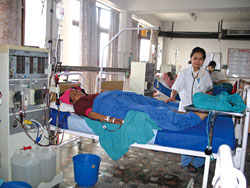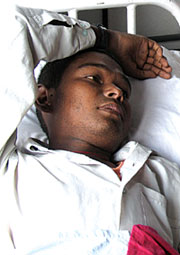|
|
"We need to save him as long as we can," says Ram Krishna Dulal, a public health expert who specialises in diabetes and kidney disease and is also chief administrator of the hospital, the country's largest dialysis centre.
Treatment has impoverished the Lama family. One dialysis session at NKC costs Rs 2,000 and he needs three sessions a week. Still, this is cheaper than going to India, or at other hospitals where he has to wait his turn.
Lama's father in Nawalparasi has sold his house and all the family's property to pay the bills and now lives destitute in the monastery in Swayambhu with the rest of the sick man's family. In the next room (pic, above) Ramesh Poudel, a 27-year-old policeman, is suffering from chronic kidney failure caused by hypertension and has taken 442 dialysis sessions in five years. Two friends who work in Qatar are paying for his treatment after the Nepal Police stopped footing the bill. Poudel says, "I just hope that I can get better one day and work again." But that is unlikely unless he can get a transplant.
Public health experts say a silent kidney disease epidemic is sweeping Nepal because of changing lifestyles. Hypertension and diabetes top the growing list of reasons for kidney disease. About 14 percent of Nepalis 20 years or older and around 19 percent of those over 40 are reported to have diabetes. A quarter of them develop kidney failure if not treated. "We can easily expect a growing number of kidney failure patients in the short run," says Rishi K Kafle, one of only 10 nephrologists in the country.
Globally, up to 10 percent of the population suffers from some form of kidney disease. But only a fraction of those who have it in Nepal come to the National Kidney Centre and other hospitals in Dharan, Pokhara and Nepalganj that offer treatment. For most it is already too late, or they can't afford even a disalysis.
 "Many die even before being diagnosed in areas where there are no facilities as not everyone can come to the capital for treatment," explains Kafle. All the country's experts are permanently based in Kathmandu and two from the government-run Bir Hospital have not returned from London where they went for further studies seven years ago. Established in 1995, the NKC has grown into a national hospital that attracts most kidney failure patients because of its high quality and affordable treatment.
"Many die even before being diagnosed in areas where there are no facilities as not everyone can come to the capital for treatment," explains Kafle. All the country's experts are permanently based in Kathmandu and two from the government-run Bir Hospital have not returned from London where they went for further studies seven years ago. Established in 1995, the NKC has grown into a national hospital that attracts most kidney failure patients because of its high quality and affordable treatment.
The number of dialysis sessions at NKC has increased from 724 in 1998 to 1,029 in just January 2006. It has more dialysis machines (20) than the country's largest hospitals, including Bir, Army Hospital, Teaching Hospital and Nepal Medical College put together.
As a public service institution, NKC cut its already subsidised cost of dialysis from Rs 3,500 to Rs 2,000 per four-hour session which means the centre is struggling to make ends meet. Its dialysis machines are donated by German hospitals and overheads are partly covered with donations from German benefactors Beate Vogt and Richard Storkenmaier. NKC needs to expand to meet the demand of Nepalis for affordable treatment, but has no space or money. In fact, it is now finding it difficult just to pay overhead costs.
Before NKC opened, Nepali kidney patients simply died while waiting their turn at Bir's single dialysis machine (see: 'The worst disease for a Nepali', NT, #97). Others who could afford it went to India for treatment for transplants. The demand for kidneys is so high and the price so tempting that many Nepalis are falling victim to kidney brokers to sell one of their kidneys.
Meanwhile the National Kidney Centre, despite the vital service it provides the nation, is itself in urgent need of a financial dialysis.
[National Kidney Center, Naxal,
Tel: 4429866]
Everyone at risk
Early detection and prevention, via simple and cheap tests, are the keys to keeping kidneys healthy. Even if you are diagnosed with an unhealthy kidney (when kidney cells lose their ability to filter minerals and balance the body's fluids) there is no need to panic as the excellent treatment available in Nepal can slow kidney failure. But ignoring an early diagnosis and postponing treatment could lead to serious problems because chronic kidney failure is always progressive, incurable and irreversible. Dialysis can last a lifetime and patients need a special diet, regular blood tests and an expensive blood transfusion injections called erythropoietin. In addition, after kidney failure a patient is 10 times more likely to get cardiovascular disease. Kidney failure is virtually a disease multiplier.
Why not transplant?
It is not a lack of skilled doctors or lack of kidney donors that has discouraged kidney transplant in Nepal but the 'Transplant Act', which makes transplants legal but risky for doctors. They say the law is unclear but could mean that if a kidney donor dies, the doctor can be sentenced to five years in prison and fined Rs 500,000. A clause says that if a donor dies within three months of the operation due to psychological trauma or shock, the physician can face life in jail. Because of the Act, many Nepalis have no choice but to go to India for transplants, where they spend Rs 500,000 to Rs 1 million. Doctors say they can do transplants safely but the government has to amend the law before they'll start operating.
Saviours needed  Ramesh Lama used to work as a driver but now he depends on his carpet weaver wife to support him, his 7-year-old son and a daughter who is barely 16 months. The family has already run out of money to pay for his dialysis, the only thing that is keeping him alive. "The wife calls us every day appealing for help," says Shanti Gurung, one of two students at St Xavier's College who have raised Rs 16,000 for the treatment. They have also opened a bank account but have got no contributions to date. Bir Hospital has been providing Lama free medicine and another individual, Kedar Karanjit, gives Lama free blood from his blood bank.
Ramesh Lama used to work as a driver but now he depends on his carpet weaver wife to support him, his 7-year-old son and a daughter who is barely 16 months. The family has already run out of money to pay for his dialysis, the only thing that is keeping him alive. "The wife calls us every day appealing for help," says Shanti Gurung, one of two students at St Xavier's College who have raised Rs 16,000 for the treatment. They have also opened a bank account but have got no contributions to date. Bir Hospital has been providing Lama free medicine and another individual, Kedar Karanjit, gives Lama free blood from his blood bank.
To help contact:
[email protected]
Tel: 9803168643



